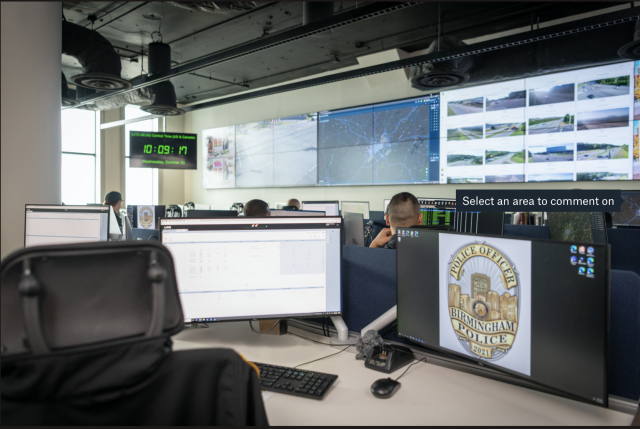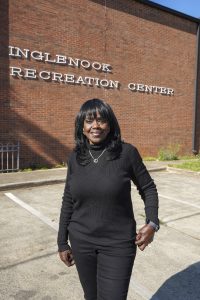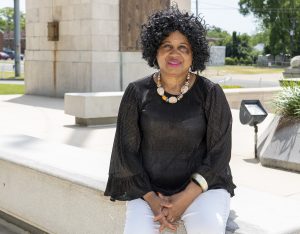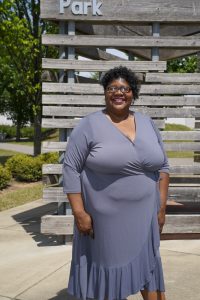
By Ryan Michaels
The Birmingham Times
Birmingham’s newly unveiled $3 million Real-Time Crime Center (RTCC) is a “huge leap forward” for the Birmingham Police Department (BPD) and the city, according to Chief Patrick D. Smith, but neighborhood leaders say reducing crime is about more than just cameras and a high-tech center.
Smith, who was recently reappointed as police chief by Mayor Randall Woodfin, drew attention to the recent buildout of the RTCC on the fourth floor of BPD headquarters at 1710 1st Ave. N. as a significant crime-fighting tool.
Last month, a ribbon-cutting was held for the center, which will operate 19 hours a day with anywhere from five to eight officers staffing the center during each shift. Still currently under construction, the RTCC will monitor a variety of information sources that cover immediate activity in the city and have space for other crime analysis, including forensics.
“Before the RTCC, [officers were] basically working off of a lot of old-school policing methods, or [they were] strictly relying on training,” said BPD Public Information Officer Sgt. Rodarius Mauldin. “As time goes on, [though], criminals are getting smarter and using technology as well, so we have to make sure we keep up with our technology.”
Neighborhood Concerns
Still, Birmingham residents say the city needs more than new technology to curb violent crime in the city.

Neighborhood Association and a retired BPD officer. (FILE)
Gwen Webb, president of the Inglenook Neighborhood Association and a retired BPD officer, said the department needs to “beef up” patrols and expect more from beat officers, like they did when she was on the force for more than a decade, after starting in 1975.
“This is what our chief and deputy chief [would do at that time. They would] sit down [and say], ‘If you are the officer or officers, if that’s your beat, and all of this [crime] is going on on your beat, I want to know why it’s happening and what you are doing about it? If crime increases on your beat, we’ve got a problem.’”
Webb added that officers need to “Get to know your neighborhood. Get to know your beat.” She would be fine with the RTCC if it actually helps the community, she said.
“Take care of this drug problem in our neighborhoods, take care of all of this killing that is produced by the drug problem,” Webb said. “If [the RTCC] is going to take care of that, then it’s well worth the money that was invested into it. [On the other hand], if it is just something else to quiet the people down simply because [the BPD doesn’t] know what’s going on, then I say, ‘Birmingham, we still have a problem.’”

Neighborhood Association. (FILE)
Patricia Davis, president of the Smithfield Neighborhood Association, said the RTCC is “wonderful” because Birmingham needs to do more to counteract violence, but neighborhoods need a lot of attention that includes more than crime reduction.
“We need more funding and to get more people employed, better housing,” Davis said.
“Just One Tool”

Former Central Park Neighborhood Association President Susan Palmer questioned whether the new center would bring change to “high-crime Black communities” and areas like the Five Points West community, where she lives.
“[Where are the cameras] out there to catch some of these crimes with or without a crime center?” said Palmer, who currently serves as president and founder of Neighborhood Advocates for Justice in Five Points West.
Chief Smith said the RTCC is “just one tool” in the BPD’s efforts to reduce crime.
“This is just another full-scale tool and method of investigating that we hope will improve the services we provide here in the city, and we hope will improve overall quality of life,” said Smith, who added that he wants to cooperate with Birmingham’s citizens, particularly the neighborhood officers who have the most direct insight into communities.
“We still want our residents and businesses to work with us. If they want cameras in their neighborhood and the 99 neighborhood presidents want cameras in their neighborhoods, tell us,” Smith said. “Let’s work together to resolve crime. [Residents] know where the problems are long before we do.”
Quick Response
Smith, specifically citing the 2019 murder and kidnapping of 3-year-old Kamille “Cupcake” McKinney, said the new facilities will allow BPD to quickly respond to incidents within the city.
“If the ‘Cupcake’ incident that occurred years ago happened today, we would be able to set up a full command post [at the RTCC], where we have real-time, situational awareness to whatever the emergency is in the city,” Smith said. “That, to me, is the best way to go to make sure we have everything we need for whatever circumstances arise.”
The BPD’s new technology includes automated license plate readers (ALPRs)—high-speed, computer-controlled camera systems that are typically mounted on utility poles, streetlights, highway overpasses, and mobile trailers, or are attached to squad cars. ALPRs capture all license plate numbers that come into view, along with the location, date, and time. The data, which includes photographs of the vehicle and sometimes its driver and passengers, is then uploaded to a central server. The readers help in every level of crime, from finding stolen vehicles to tracking violent suspects.
Another RTCC feature is new body-worn camera technology that will allow officers working the crime center to remotely turn body-worn cameras on and off, so interactions can be viewed as they occur, Smith told AL.com.
Other components of the center include a video feed from cameras placed around the city and worn on officers in the streets, GPS data from officers in the streets, and gunshot-detection software.
Also, officers working in the RTCC can easily communicate with those on the ground to provide updates on changing factors for a given incident. In addition to the technology, the RTCC has a new conference room that can display the same information on TV screens.
“Working Hard”
Moving forward, Chief Smith believes that putting more money into tools like the RTCC is necessary to improve public safety.
“We have to thoroughly invest in public safety,” he said. “If we want to see change in this city, we have to invest in in public safety, invest in this police department to make things happen.”
Smith added that the BPD is “working hard” every day for the citizens of Birmingham.
“It’s our goal to improve the services that we provide and to make sure Birmingham stays where it needs to be in terms of technology, fighting crime, and implementing new measures that are necessary to make a difference,” he said.
Anyone with information on shootings or violence in their community is encouraged to call 911 or Crime Stoppers at 205-254-7777.
"crime" - Google News
November 04, 2021 at 08:29AM
https://ift.tt/3wgJsZy
What Birmingham Residents Are Saying About BPD's $3M Crime Center - Birmingham Times
"crime" - Google News
https://ift.tt/37MG37k
https://ift.tt/2VTi5Ee
Bagikan Berita Ini














0 Response to "What Birmingham Residents Are Saying About BPD's $3M Crime Center - Birmingham Times"
Post a Comment